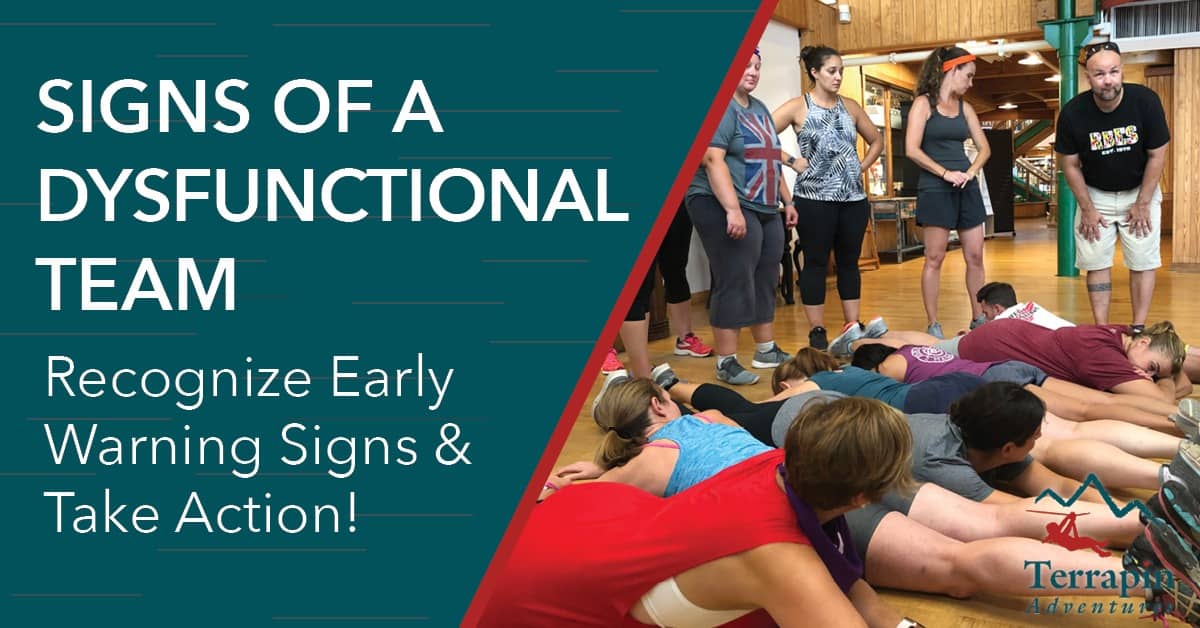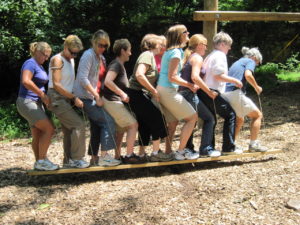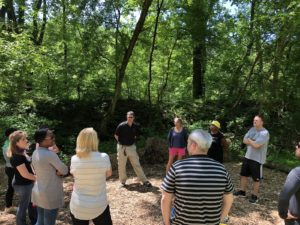
Dysfunction can pop up, even within the best of teams, despite a manager’s best efforts. Worst of all, problem areas are not always obvious. It’s critical that managers lookout for the warning signs of a dysfunctional team in order to intervene and correct small issues before they snowball into a full-blown catastrophe.
“Sometimes things happen outside of the leader’s control, and some problems are harder to spot than others,” according to the Forbes Coaches Council.
Common Warning Signs of a Dysfunctional Team
“If you can recognize the symptoms of the problem, you can take steps to get your team back on track,” says the Forbes Coaches Council.
Keep in mind: dysfunction exists on successful teams, too. “Ironically, the team’s successes mask serious dysfunctional aspects,” warns Dave Anderson, Learn to Lead. “Make no mistake though, the dysfunctional team is successful in spite of these dysfunctions, not because of them.”
Here are a few early warning signs of a dysfunctional team to look for…
- Communication Breakdowns: “The ability to communicate is a cornerstone of effective intergenerational teams,” write Jill M. Moore, PhD, RN, CNE; Marcee Everly, DNP, ND, MSN, RN, CNM; and Renee Bauer, PhD, MS, RN. When that communication breaks down, dysfunction is not far behind. This is a great place to intervene, and is often a pretty easy warning sign to notice.
- Lack of Trust: High functioning teams collaborate well together; they rely on each other. Lack of trust is a clear indication of a larger issue. This is not always easy to spot. Watch for team members who try to do everything themselves, or come to you, the manager, instead of approaching their colleagues.
- No Healthy Conflict: “Healthy teams have productive conflict,” says Anderson, “where teammates can speak up and give a contrary opinion, challenge ideas, and address underperforming issues within the organization without getting personal or in fear of reprisals.” The problem arises when:
- this conflict turns negative or personal or…
- there is no conflict at all. The latter means there is either a breakdown in trust or communication.
- Intergenerational Tension: “In any one company there may be people from four different generations working together, all with different career ethics, goals, and values,” says Katie Morell, Meetings Today. This diversity is invaluable, but it can also lead to conflict. We dissected the advantage of a generational gap in 2018!
- An Exodus of Talent: Losing one talented employee is expected from time to time. Losing multiple talented employees in a short amount of time could be a warning sign. “If your turnover is very high, something is dysfunctional within the team,” says the Forbes Coaches Council. “It could mean there is a lack of trust, the culture is oppressive, or the pay is not competitive.”
- Low Morale: “As teams turn dysfunctional, members start to withdraw — often before they’re even aware they’re doing it,” says Forbes. “They’re just not as invested in the process or the outcome.” So, if you start to notice a lack of enthusiasm or creativity, it could mean something is wrong. Take action!
“For business owners and employers, if you are seeing these behaviors throughout your organization then you need to quickly grab a hold of the problem and address it heads on,” writes Daniel Newman. Remember, effective teams don’t happen magically.
“High-performing teams aren’t the result of a happy accident, research shows,” says Judith A. Ross, Harvard Business Review. “[Teams] achieve superior levels of participation, cooperation, and collaboration because their members trust one another, share a strong sense of group identity, and have confidence in their effectiveness as a team.”
Learn the Secret to High Functioning Teams
“High-functioning teams are what make high-performing companies click,” writes Ross. And truth be told, the secret to improving team performance isn’t really a secret. It’s Team Building! Heck, the outcome is right there in the name.
“When done well, team-building activities can…help build better relationships and increase communication among your team members,” says Lynn Flinn, CPA, president and managing partner of The Rowland Group of Staffing Companies. This, in turn, leads to higher morale and better performance. Here’s how it works…
Custom Experiences
Every team building exercise is designed to achieve certain goals. These goals are often pre-defined by the business owner or manager as opportunities for team growth. But these exercises don’t feel like work – they’re fun! And our team building programs are designed that way for a reason. “Play has been found to speed up learning, enhance productivity and increase job satisfaction,” says Lynn Barnett, a professor of recreation, sports and tourism at the University of Illinois at Urbana-Champaign. Play can also “enhance bonding and communication.”

The Reflection
After each team building exercise, your group will sit down with their facilitator to discuss the lessons behind each activity and how they translate to the business world. This discussion is designed to reinforce these lessons and help ensure that the progress made during your team building outing sticks. This also allows facilitators to call out specific aspects of the exercise. Who took the lead? How did they lead? Did they listen to the rest of their group? Was everyone involved in the process? What were the group’s strengths, and what were their weaknesses?

This debrief period is oftentimes an eye-opening experience for team members. Some people may not be aware that they took a back seat or, conversely, dominate the conversation and hinder collaboration.
Effective Team Building is a Process
Team building should not be a one and done event. Effective team building takes time. Follow-up sessions are important. These follow-ups not only help ensure that the lessons learned stick, but also allow facilitators to focus on concentrated problem areas during each session.
“By speaking with our clients about their objectives, we’re able to focus on specific goals,” says Matt Baker, Chief Adventure Officer at Terrapin Adventures. And based on a group’s previous performance, we can recommend complementary programs.

“When team building is coupled with follow-up sessions in which team building commitments are reinforced and renewed, the positive effects of the team building are prolonged,” writes researcher R. Wayne Boss.
Build Your Custom Team Building Program
“Team building is the most important investment you can make for your people,” says Brian Scudamore, O2E Brands founder and CEO.
Conveniently located between Baltimore and Washington DC, Terrapin Adventures is able to create a truly customized team building program (onsite or offsite, indoor or outdoor) to help improve communication, build trust, and better collaboration within your team. We service Maryland and Washington, D.C., and have traveled to other states as well.
Click Here to Schedule Your Customized Team Building Event!
If you have any questions, please call Terrapin Adventures at 301.725.1313, or email us at info@terrapinadventures.com to learn more.
